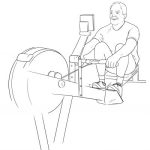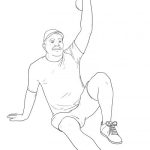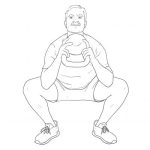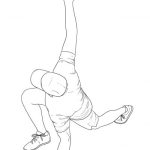CPTs can apply general knowledge of clients’ nutritional requirements and changing diets to capably support their muscular performance. Our skeletal muscles (which ancients called “little mice”) are chemical, motion marvels: vitamins and minerals that have been adequately absorbed are “banked” over several to many weeks.
Granted, most personal trainers are not registered dietitians or nutritionists. Yet our general acumen, augmented by certified continuing education, may help our older clientele combine lifestyle with fitness to achieve their bespoken goals, such as weight loss/gain, strength or muscle gain, and cardiovascular capacity.
In a generational context, today’s older clients, synonymous with Baby Boomers, ingest more sodium and calcium than their parents did. Conversely, they consume less vitamin C, potassium, and magnesium than the Greatest Generation which was credibly studied. Both times and people change.
Our clients’ wellness support could include the sharing of America’s Dietary Guidelines 8th Edition (2015-2020). The USDA also offers unique MyPLATE guidance for many elders in our general population.
Those guidelines offer three (3) solid nutritional tips for baby boomers:
- Focus on needed nutrients for each unique client, including potassium, calcium, vitamin D, vitamin B12, minerals, and dietary fiber.
- Lose weight or maintain a healthy weight.
- Meet individual calorie and nutrition needs to help maintain energy levels.
With our government’s dietary guidelines refreshed, we should acknowledge that older fitness-oriented folks may have notably different needs to “maintain energy levels”, perform at their best, and stay well.
Muscular Health from Micro-sources
Nutri-Facts scientists offer sthis relevant attention grabber “…vitamin and mineral status is essential for normal health, marginal deficiency states may only be apparent when the metabolic rate is high. An increased food intake to meet these requirements will generally increase the intake of dietary micro-nutrients. [Older] athletes may need to pay particular attention to their intake of several micronutrients.”
Demerits and Merits
The balance or inbalance of micro-nutrients will contribute to the relative “banking” of health benefits; the presence of one micro-nutrient in the correct balance with reward the body with a “merit” while the deficiency or overabundance of another micro-nutrient would issue a “demerit”.
For instance, the effects of inadequate Vitamin B12 in the body issue a demerit for these side effects:
- numbness
- tingling
- difficulty walking
- memory loss
- disorientation
- dementia¹
This B12 Vitamin “void” is certainly one that older clients and we should be aware of. That demerit certainly becomes higher if a client is vegetarian, or is not increasing her or his food intake.
Conversely, the presence of the mineral Zinc at sufficient levels (which varies by gender and age) is merited for optimal:
- Function of the immune system
- DNA synthesis and cell division
- Protection of cell constituents from oxidative damage
- Metabolism of fatty acids
- Macronutrient metabolism²
√ Adequate Zinc absorption may offset exercise-induced free radical oxidative damage.
√ Adequate Zinc absorption may help with older males’ virility functions as well.
√ Zinc may help sarcomeres synthesize proteins from received amino acids.
Selective “Micro” Banking for Vitality
Emphasizing that each client is unique and that medical or nutritional professionals make formal client recommendations, Table 1 generically summarizes select (but not all) key vitamins and minerals as micro-nutrients that might necessitate more focus or directed supplementation.
There are well-documented side effects of some micro-nutrients when individual thresholds are exceeded: the fat-soluble Vitamin E being one of which to be aware.
| Selected Micro-nutrient | Key Consideration for Older Client(s) |
|---|---|
| Vitamin C | 250 milligrams (mg)/day
The Government’s Recommended Daily Allowance for older women is 75 mg, and 90 mg for men. |
| Vitamin D3 | 1000 IU / day
15 to 20 minutes of solar exposure daily is a natural way to generate some of this vital micro-nutrient. If immunity is a pressing issue, as is the case for Rhinovirus and novel Coronavirus [COVID], this 1000 IU level might be raised. Check what Dr. Anthony Fauci takes daily.] |
| Vitamin E | A normal Diet may suffice for adequate absorption of this fat-soluble Vitamin. |
| Note for Vitamin B-12 | If an elder is a vegetarian, or not eating proper energy-dense macro-nutrients; Vitamin B12 could be deficient too. |
| Calcium (Ca) | 400 mg/day [Older clients generally gain adequate Calcium from dairy and other macro-nutrient sources].
Some older women have an extraordinary need for CA absorption to maintain bone density after menopause. Calcium and Vitamin D3 are complementary micro-nutrients for optimal absorption. |
| Iron (Fe) | Normal Macro-nutrient diets are adequate for older clients’ Iron (Fe) levels.
The livingto100 calculator credibly advises that excess retained Iron is a detriment to long life, particularly for males. |
| Magnesium (Mg) | 400 milligrams(mg)/day
Most older clients fail to absorb adequate Magnesium. Note: Blood draws may NOT accurately measure cellular absorption of this vital mineral. |
| Selenium (SE) | 55 micrograms (µ/day)
This tiny level should not be underestimated. Its metabolic role is key for a Master’s athletic performances. |
| Sodium (Na) | This exception is to reduce ingestion for most older clients!
Most older clients ingest MORE than their MDRs of 2.3 grams of salt per day. Concerns of hypertension and Metabolic Syndrome (MetS) are high when excess Sodium is retained. |
| L-Carnitine | 2-6 grams per day (If needed). Vegetarians’ Doctors may find a want or need for this amino acid supplementation. |
| Ubiquinol – CoQ10 | 200 mg/day. As our bodily generation of this heart-healthy micronutrient drops notably with age, a professional might suggest supplementation. |
| Zinc (Zn) | 11 mg/day Zinc is essential for good vision, libido, and immunity. |
| Other Considerations for our Older Clients | -One reason why it takes years to become a registered dietitian is the practical knowledge for undesirable side-effects – such as for Calcium and Vitamin D interactions.
-Whole food ingestion is usually superior to ergogenics or supplements as a first-order for getting those micro-nutrients “banked.” -It is good to remember that four key vitamins for clients of all ages (A, D, E, and K) need fatty acids [“healthy fat”] for optimal absorption. -Blood test lab results may not reflect true cellular absorption. Professional advice should be considered. |
Banking Micro-nutrients Properly
Former President Obama’s Council for Fitness, Sports, and Nutrition (2014) stated:
“Masters athletes and their coaches, physicians, dietitians, and other healthcare professionals need to be aware of changes in physiology that occur with age.” Consider this Geriatric Doctor’s warning and call-to-action for baby boomers and their interrelated nutrition and resistance efforts:
“As they lose muscle, metabolism slows, the weight creeps on, and disease risk escalates. The weaker they get, the less they do. Middle-age spread is merely the first step on a continuum that, if not stopped, will end up with the patient using a walker or a wheelchair down the road. All of this is almost completely preventable.”
We can help our clients prevent “middle age spread”, future use of walkers, and wheelchairs. We should help them gain personal knowledge about select micro-nutrients that can be prudently banked to offset sarcopenia and senescence of their skeletal muscles.
References
- Stabler SP, Lindenbaum J, Allen RH. Vitamin B-12 deficiency in the elderly: current dilemmas. Am J Clin Nutr. 1997; 66(4):741–749.
- MacDonald RS. The role of zinc in growth and cell proliferation. J Nutr. 2000; 130(5S Suppl):1500S–1508S
Dave Frost has served the fitness community as a NFPT-certified CPT since 2013, and a Master Fitness Trainer since 2019.
As a Medicare-aged baby boomer, he specializes in training those clients who intend to stay “well past forty”.
He is a former world champion in Masters Rowing and National Indoor Rowing champion for his age group. He is also a group fitness instructor for The Row House. His website is https://wellpastforty.com. Dave recently published his work: KABOOMER: Thriving and Striving into your Nineties to promote stamininety for those intending to add years to their lives and life to their years.






